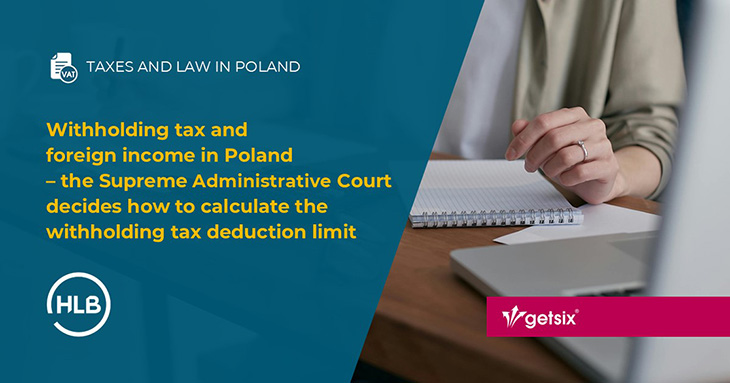Withholding tax and foreign income in Poland – the Supreme Administrative Court decides how to calculate the withholding tax deduction limit
In its judgment of 28 May 2025 (II FSK 1131/22), confirmed that when settling withholding tax (WHT) paid abroad in Poland, the deduction limit under Article 20(1) of the CIT Act refers to income earned in a foreign country, not to revenue. The ruling was made in a case involving a company whose contractor in the US deducted WHT from the amount shown on the invoice. Below, we discuss the essence of the dispute, the positions of the Director of the National Tax Information (DKIS) and the Regional Administrative Court (WSA), and the reasons for the Supreme Administrative Court’s (NSA) ruling.
In this article:
Licences, WHT on revenue and lack of cost records – background to the case
A limited liability company sells licences for its own software both in Poland and abroad, including to a contractor in the US. When paying wages, the American entity deducts withholding tax (WHT) from the amount shown on the invoice, i.e. from the revenue, without taking costs into account.
In Poland, the company settles CIT on the total result – it adds up domestic and foreign revenues and then deducts the costs of obtaining revenues. However, these costs are largely common to the entire business and were not recorded separately for each market, which made it difficult to attribute them to sales in the US.
Against this background, the company requested an interpretation: can the limit on the deduction of tax paid abroad (Article 20(1) of the CIT Act) be determined as a proportion of revenue generated in the US to total income, and then applied to Polish tax, since the revenue was taxed in the source country?
Two approaches to WHT deduction
The dispute stems from the wording of Article 20(1) of the CIT Act: the introduction to the provision states: ‘income (revenues)’ earned abroad, while the deduction limit refers only to ‘income earned in a foreign country’. Against this background, two opposing approaches have emerged.
Position of the Director of the National Tax Information (DKIS)
The Director of the National Tax Information ruled that Article 20(1) of the CIT Act applies the deduction limit only to income earned in a foreign country. Therefore, if income tax was deducted abroad, the taxpayer should, for the purposes of Polish tax settlement, allocate the relevant portion of costs to foreign income (according to Polish rules) and only then compare the foreign income thus determined with Polish tax.
Judgment of the Regional Administrative Court in Warsaw.
The court of first instance took the opposite approach: since the income was actually taxed in the source country, it can be treated as income for the purposes of the Polish proportion, especially when there are no records allowing the costs to be attributed to a specific market. The Provincial Administrative Court referred to the principle of resolving doubts in favour of the taxpayer (in dubio pro tributario).
Where do the interpretative doubts come from?
- Mixed terminology in the provision
- The nature of WHT
- The law applicable to determining ‘income’
- Financial effect
The first part of Article 20(1) of the CIT Act refers to ‘income (revenue)’, while the deduction limit is defined using only the term “income”. This raises the question of whether, in the absence of ‘income’ in the source country (because WHT was collected on revenue), revenue can be substituted for the proportion.
In practice, withholding tax is often a lump sum – calculated on the amount of the invoice/revenue, without costs. Hence the dilemma: should the Polish limit refer to this amount, or should income be determined based on the allocation of costs according to Polish rules?
The question arises as to which rules should be used to determine foreign income: local (source country) or Polish.
Equating revenue with income would result in a higher deduction limit, which explains the preference of taxpayers and the negative position of the authorities
The Supreme Administrative Court’s ruling: income, not revenue
The Supreme Administrative Court overturned the judgment of the Regional Administrative Court in Warsaw and upheld the cassation appeal lodged by the Director of the National Tax Information Service. The court ruled that in the part concerning the deduction limit, Article 20(1) of the CIT Act uses only the term ‘income obtained in a foreign country’ – and this term must not be equated with revenue, even if withholding tax abroad was collected on the amount shown on the invoice.
The Supreme Administrative Court highlighted the limits of interpretation: linguistic interpretation takes priority, which is why the principle of in dubio pro tributario does not apply in this case. Since the provision uses ‘income’ to determine the limit, the taxpayer is obliged – for the purposes of Polish settlement – to determine foreign income according to Polish rules, which in practice means assigning the relevant part of the costs to the revenue obtained in the source country.
At the same time, the Court underlined the distinction between the categories of ‘income’ and ‘revenue’ in Article 20(1) of the CIT Act: although they appear side by side in the initial part of the provision, when determining the limit, the legislator uses only “income” — equating it with ‘revenue’ at this stage is unacceptable. The ruling corresponds to a more recent line of jurisprudence, which emphasises the need to determine ‘foreign income’ on the basis of Polish regulations, regardless of how tax is structured in the source country.
What does this ruling mean for entrepreneurs?
- Determining ‘foreign income’ according to Polish rules. Even if WHT has been collected on revenue abroad, for the purposes of Polish CIT, costs must be allocated to this revenue, and income must be determined for each country.
- Consistent methodology and documentation. It is worth describing the adopted allocation keys (e.g. revenue, hourly, project) in the tax and accounting policy and preparing a short methodological note with source data.
- Settlements ‘per country’. The deduction limit and any deduction are determined separately for each jurisdiction; combining multiple countries into a single proportion increases the risk of errors.
- Verification of UPO (Official Confirmation of Receipt.) and WHT evidence. Each time, it is necessary to check the appropriate method of avoiding double taxation and collect a complete set of documents (including a certificate of residence and confirmation of tax collection).
- Impact on the budget and risk. The deduction in Poland may be lower than the amount of WHT collected abroad; the lack of an allocation methodology increases the risk of adjustments, interest and disputes with the authorities.
- Review of settlements. It is advisable to review current and previous calculations where a proportion of revenue was used and to organise the approach for the future.
The Supreme Administrative Court ruling stipulates that when deducting withholding tax (WHT) paid abroad, the reference point is income earned in a foreign country, not revenue. This means that costs must be allocated to foreign revenue according to Polish rules, and calculations and documentation must be kept separately for each country. The court rejected the possibility of ‘replacing’ income with revenue and ruled out the application of the in dubio pro tributario principle in this regard. For entrepreneurs, this is a signal to organise their cost allocation methodology, verify their previous settlements and ensure that they have a complete set of WHT evidence.
getsix® supports entrepreneurs in the area of withholding tax (WHT) – we help to organise settlements, ensure compliance with regulations and reduce tax risks in international operations.
If you have any questions regarding this topic or if you are in need for any additional information – please do not hesitate to contact us:
GETSIX TAX & LEGAL

Tomasz Nowak
Senior Tax Consultant
getsix Tax & Legal
***














